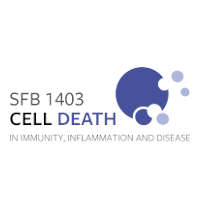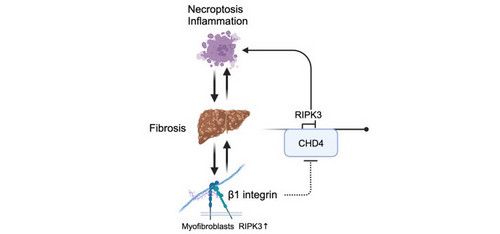β1 integrin signaling governs necroptosis via the chromatin-remodeling factor CHD4.
Abstract
Fibrosis, characterized by sustained activation of myofibroblasts and excessive extracellular matrix (ECM) deposition, is known to be associated with chronic inflammation. Receptor-interacting protein kinase 3 (RIPK3), the central kinase of necroptosis signaling, is upregulated in fibrosis and contributes to tumor necrosis factor (TNF)-mediated inflammation. In bile-duct-ligation-induced liver fibrosis, we found that myofibroblasts are the major cell type expressing RIPK3. Genetic ablation of β1 integrin, the major profibrotic ECM receptor in fibroblasts, not only abolished ECM fibrillogenesis but also blunted RIPK3 expression via a mechanism mediated by the chromatin-remodeling factor chromodomain helicase DNA-binding protein 4 (CHD4). While the function of CHD4 has been conventionally linked to the nucleosome-remodeling deacetylase (NuRD) and CHD4-ADNP-HP1(ChAHP) complexes, we found that CHD4 potently repressed a set of genes, including Ripk3, with high locus specificity but independent of either the NuRD or the ChAHP complex. Thus, our data uncover that β1 integrin intrinsically links fibrotic signaling to RIPK3-driven inflammation via a novel mode of action of CHD4.
Read more at Cell Rep. 42, 113322.

